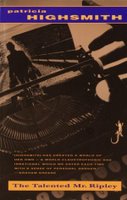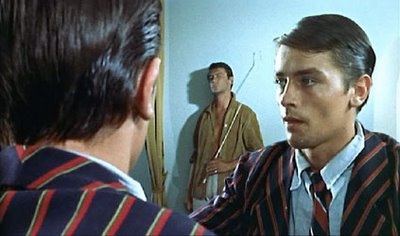 Tom Ripley suggests that identity is as much a matter of habit and performance as of inheritance or the law.
Tom Ripley suggests that identity is as much a matter of habit and performance as of inheritance or the law. The eponymous protagonist of Patricia Highsmith's The Talented Mr Ripley is sent by a wealthy American businessman, Herbert Greenleaf, to persuade his son to return to the States from an overlong sojourn in Italy. But young Dickie Greenleaf has pretensions as a painter, a life of much ease and little responsibility, and scant incentive to "come back to subways and taxis and starched collars and a nine-to-five job" (52). Seeing Greenleaf's fortune, Ripley "envied him with a heartbreaking surge of envy and of self-pity" (52).
So Tom abandons his mission, and seeks rather to become a part of Dickie's life, a fixture in the rounds of excursions to beach and café in the village of Mongibello, or further afield to Capri or the Alps, perhaps even to Paris. Tom wants to see the sights, to educate himself by means of a European Grand Tour in the company of his new friend. But bonding with Greenleaf means prising him away from the only other American in the village: Marge Sherwood, with whom Dickie has an on-again off-again romantic engagement, more strongly pursued by Marge than by Dickie. Ripley's goal, then, is to prevent Greenleaf from falling into Marge's heterosexual trap.
But Dickie is hardly any keener to reciprocate Tom's advances than Marge's. Not that Tom's desires are straightforwardly homosexual: Slavoj Zizek calls him a "male lesbian" rather than a "closet gay" ("When Straight Means Weird"). I'm not so sure about that, but it's noticeable that in this novel permeated by accusations and counter-accusations of "sexual deviation," nobody actually gets to have sex. "Tom laughed at that phrase 'sexual deviation.' Where was the sex? Where was the deviation?" (147).
Indeed, what leads Ripley eventually to murder is a desire to go straight, or rather, not to accept deviation, not to give up on desires that have more to do with class than with sexuality. And a more direct route to Dickie's lifestyle means doing away with the need for reciprocity, and simply taking on the other's identity: "He could--he had just thought of something brilliant: he could become Dickie Greenleaf himself. He could do everything that Dickie did. [. . .] He could step right into Dickie's shoes" (100-101).

So Tom clubs Dickie to death on a boat trip off San Remo and soon finds himself "happy, content, and utterly, utterly confident, as he had never been before in his life" (112). "It was impossible to be lonely or bored, he thought, so long as he was Dickie Greenleaf" (122). And as far as Tom is concerned, he is Dickie Greenleaf. It is not that he is playing at being Dickie, it is that he has subsumed his identity. "This was," Tom reflects, "the real annihilation of his past and of himself, Tom Ripley, who was made up of that past" (127).
So when, after a series of scrapes and near-misses both with the law and with Dickie's friends--one of whom has also to be put away--Tom returns, somewhat reluctantly, to being Tom Ripley, this too becomes a performance: "He began to feel happy even in his dreary role as Thomas Ripley. He took a pleasure in it, overdoing almost the old Tom Ripley reticence with strangers, the inferiority in every duck of his head and wistful, sidelong glance" (194). And being Tom as much as (perhaps more than) being Dickie requires that he tell a series of tall tales to head off the suspicions of the police, Mr Greenleaf Sr, and Marge. But he carries them off: "his stories were good because he imagined them intensely, so intensely that he came to believe them" (256).
Which is why I'm not sure either of Zizek's characterization of Ripley in terms of "disengaged coldness." It's true that Tom's attachments disrupt conventional notions of propriety and trust, constancy and reliability. But isn't that precisely because of their intensity, an intensity in the contraction of habits and susceptibility to affect that is positively inhuman? Tom endlessly changes shape and shifts identity not so much to negate his old habits but to experience new sensations. If he is repulsed by so many of the characters he meets along the way, is it not because they accept their own limitations? Tom always wants more, which means also feeling more.
And surely the book's final lines express enthusiasm more than they evince snobbery: "'To a hotel, please,' Tom said. 'Il meglio albergo. Il meglio, il meglio!'" (295).
No comments:
Post a Comment